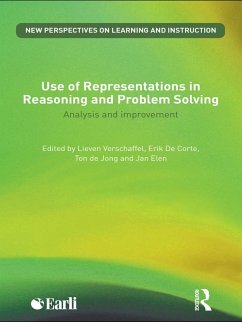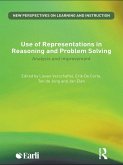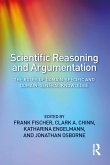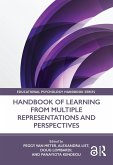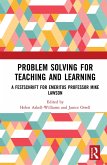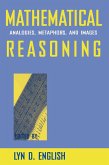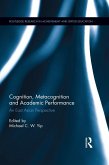Use of Representations in Reasoning and Problem Solving (eBook, ePUB)
Analysis and Improvement
Redaktion: Verschaffel, Lieven; Elen, Jan; de Jong, Ton; De Corte, Erik
60,95 €
60,95 €
inkl. MwSt.
Sofort per Download lieferbar

30 °P sammeln
60,95 €
Als Download kaufen

60,95 €
inkl. MwSt.
Sofort per Download lieferbar

30 °P sammeln
Jetzt verschenken
Alle Infos zum eBook verschenken
60,95 €
inkl. MwSt.
Sofort per Download lieferbar
Alle Infos zum eBook verschenken

30 °P sammeln
Use of Representations in Reasoning and Problem Solving (eBook, ePUB)
Analysis and Improvement
Redaktion: Verschaffel, Lieven; Elen, Jan; de Jong, Ton; De Corte, Erik
- Format: ePub
- Merkliste
- Auf die Merkliste
- Bewerten Bewerten
- Teilen
- Produkt teilen
- Produkterinnerung
- Produkterinnerung

Bitte loggen Sie sich zunächst in Ihr Kundenkonto ein oder registrieren Sie sich bei
bücher.de, um das eBook-Abo tolino select nutzen zu können.
Hier können Sie sich einloggen
Hier können Sie sich einloggen
Sie sind bereits eingeloggt. Klicken Sie auf 2. tolino select Abo, um fortzufahren.

Bitte loggen Sie sich zunächst in Ihr Kundenkonto ein oder registrieren Sie sich bei bücher.de, um das eBook-Abo tolino select nutzen zu können.
Use of Representations in Reasoning and Problem Solving brings together contributions from leading international researchers in from educational psychology, cognitive science and related fields, to document the role which representations play in our understanding, learning and communication.
- Geräte: eReader
- mit Kopierschutz
- eBook Hilfe
- Größe: 2.01MB
Andere Kunden interessierten sich auch für
![Use of Representations in Reasoning and Problem Solving (eBook, PDF) Use of Representations in Reasoning and Problem Solving (eBook, PDF)]() Use of Representations in Reasoning and Problem Solving (eBook, PDF)60,95 €
Use of Representations in Reasoning and Problem Solving (eBook, PDF)60,95 €![Scientific Reasoning and Argumentation (eBook, ePUB) Scientific Reasoning and Argumentation (eBook, ePUB)]() Scientific Reasoning and Argumentation (eBook, ePUB)46,95 €
Scientific Reasoning and Argumentation (eBook, ePUB)46,95 €![Handbook of Learning from Multiple Representations and Perspectives (eBook, ePUB) Handbook of Learning from Multiple Representations and Perspectives (eBook, ePUB)]() Handbook of Learning from Multiple Representations and Perspectives (eBook, ePUB)103,95 €
Handbook of Learning from Multiple Representations and Perspectives (eBook, ePUB)103,95 €![Problem Solving for Teaching and Learning (eBook, ePUB) Problem Solving for Teaching and Learning (eBook, ePUB)]() Problem Solving for Teaching and Learning (eBook, ePUB)41,95 €
Problem Solving for Teaching and Learning (eBook, ePUB)41,95 €![Problem Solving Interviews (eBook, ePUB) Problem Solving Interviews (eBook, ePUB)]() W. E. BeveridgeProblem Solving Interviews (eBook, ePUB)29,95 €
W. E. BeveridgeProblem Solving Interviews (eBook, ePUB)29,95 €![Mathematical Reasoning (eBook, ePUB) Mathematical Reasoning (eBook, ePUB)]() Mathematical Reasoning (eBook, ePUB)60,95 €
Mathematical Reasoning (eBook, ePUB)60,95 €![Cognition, Metacognition and Academic Performance (eBook, ePUB) Cognition, Metacognition and Academic Performance (eBook, ePUB)]() Cognition, Metacognition and Academic Performance (eBook, ePUB)43,95 €
Cognition, Metacognition and Academic Performance (eBook, ePUB)43,95 €-
-
-
Use of Representations in Reasoning and Problem Solving brings together contributions from leading international researchers in from educational psychology, cognitive science and related fields, to document the role which representations play in our understanding, learning and communication.
Hinweis: Dieser Artikel kann nur an eine deutsche Lieferadresse ausgeliefert werden.
Dieser Download kann aus rechtlichen Gründen nur mit Rechnungsadresse in A, B, BG, CY, CZ, D, DK, EW, E, FIN, F, GR, HR, H, IRL, I, LT, L, LR, M, NL, PL, P, R, S, SLO, SK ausgeliefert werden.
Hinweis: Dieser Artikel kann nur an eine deutsche Lieferadresse ausgeliefert werden.
Produktdetails
- Produktdetails
- Verlag: Taylor & Francis eBooks
- Seitenzahl: 270
- Erscheinungstermin: 13. September 2010
- Englisch
- ISBN-13: 9781136943980
- Artikelnr.: 42983508
- Verlag: Taylor & Francis eBooks
- Seitenzahl: 270
- Erscheinungstermin: 13. September 2010
- Englisch
- ISBN-13: 9781136943980
- Artikelnr.: 42983508
- Herstellerkennzeichnung Die Herstellerinformationen sind derzeit nicht verfügbar.
Lieven Verschaffel is Professor at the faculty of Psychology and Educational Sciences, Katholieke Universiteit Leuven, Belgium. Erik De Corte is Emeritus Professor of the faculty of Psychology and Educational Sciences, Katholieke Universiteit Leuven, Belgium. Ton de Jong is Professor of Educational Psychology, University of Twente, Netherlands. Jan Elen is Professor at the faculty of Psychology and Educational Sciences, Katholieke Universiteit Leuven, Belgium.
Introduction by the book editors Part 1 Theoretical and empirical analyses of psychological processes in thinking and learning with external representations 1. Creative thinking and problem solving with depictive and descriptive representations Wolfgang Schnotz
Christiane Baadte
Andreas Mülle and Renate Rasch (University of Landau
Germany) 2. Instructional considerations in the use of external representations: the distinction between perceptually-based depictions and pictures that represent conceptual models Stella Vosniadou (University of Athens
Greece) 3. Critical thinking about biology during web page reading: tracking students' evaluation of sources and information through eye fixations Lucia Mason & Nicola Ariasi (University of Padua
Italy) 4. Representational fluency and flexibility in the domain of linear functions: A choice/no choice study Ana Acevedo Nistal
Wim van Dooren
Geraldine Clarebout
Jan Elen
& Lieven Verschaffel (University of Leuven
Belgium) 5. Representations and proof: the case of the Isis problem Brian Greer
Dirk De Bock
& Wim Van Dooren (1 San Diego State University 2 University of Leuven
Belgium) 6. Secondary school students' availability and activation of diagrammatic strategies for learning from texts Michael Schneider
Catrin Rode and Elsbeth Stern (Swiss Federal Institute of Technology of Zürich
Switzerland) Part 2 Development of representational tools and evaluation of their effects on student learning 7. Conceptual change in learning electricity: On the role of virtual and concrete external representations Tomi Jaakkola
Sami Nurmi & Erno Lehtinen (University of Turku
Finland) 8. Using static and dynamic visualisations to support the comprehension of complex dynamic phenomena in the natural sciences Peter Gerjets
Birgit Imhof
Tim Kühl
Vanessa Pfeiffer
Katharina Scheiter
and Sven Gemballa (Knowledge Media Research Center
Tübingen
Germany) 9. The role of external representations in learning combinatorics and probability theory Bas Kolloffel
Tessa H. S. Eysink
and Ton de Jong (University of Twente
The Netherlands) 10. Symbolizing and the development of meaning in computer-supported algebra education Koeno Gravemeijer
Michiel Doorman
and Paul Drijvers (University of Utrecht
The Netherlands) 11. The "numbers are points on a line" analogy: Does it have an instructional value? Xenia Vamvakoussi
(University of Athens
Greece) 12. Use of external representations in science: prompting and reinforcing prior knowledge activation Sandra Wetzels
Liesbeth Kester
& Jeroen van Merriënboer (University of Heerlen
The Netherlands) 13. Visualization of argumentation as shared activity Gijsbert Erkens
Paul Kirschner &
Jeroen Janssen (University of Utrecht
The Netherlands)
Christiane Baadte
Andreas Mülle and Renate Rasch (University of Landau
Germany) 2. Instructional considerations in the use of external representations: the distinction between perceptually-based depictions and pictures that represent conceptual models Stella Vosniadou (University of Athens
Greece) 3. Critical thinking about biology during web page reading: tracking students' evaluation of sources and information through eye fixations Lucia Mason & Nicola Ariasi (University of Padua
Italy) 4. Representational fluency and flexibility in the domain of linear functions: A choice/no choice study Ana Acevedo Nistal
Wim van Dooren
Geraldine Clarebout
Jan Elen
& Lieven Verschaffel (University of Leuven
Belgium) 5. Representations and proof: the case of the Isis problem Brian Greer
Dirk De Bock
& Wim Van Dooren (1 San Diego State University 2 University of Leuven
Belgium) 6. Secondary school students' availability and activation of diagrammatic strategies for learning from texts Michael Schneider
Catrin Rode and Elsbeth Stern (Swiss Federal Institute of Technology of Zürich
Switzerland) Part 2 Development of representational tools and evaluation of their effects on student learning 7. Conceptual change in learning electricity: On the role of virtual and concrete external representations Tomi Jaakkola
Sami Nurmi & Erno Lehtinen (University of Turku
Finland) 8. Using static and dynamic visualisations to support the comprehension of complex dynamic phenomena in the natural sciences Peter Gerjets
Birgit Imhof
Tim Kühl
Vanessa Pfeiffer
Katharina Scheiter
and Sven Gemballa (Knowledge Media Research Center
Tübingen
Germany) 9. The role of external representations in learning combinatorics and probability theory Bas Kolloffel
Tessa H. S. Eysink
and Ton de Jong (University of Twente
The Netherlands) 10. Symbolizing and the development of meaning in computer-supported algebra education Koeno Gravemeijer
Michiel Doorman
and Paul Drijvers (University of Utrecht
The Netherlands) 11. The "numbers are points on a line" analogy: Does it have an instructional value? Xenia Vamvakoussi
(University of Athens
Greece) 12. Use of external representations in science: prompting and reinforcing prior knowledge activation Sandra Wetzels
Liesbeth Kester
& Jeroen van Merriënboer (University of Heerlen
The Netherlands) 13. Visualization of argumentation as shared activity Gijsbert Erkens
Paul Kirschner &
Jeroen Janssen (University of Utrecht
The Netherlands)
Introduction by the book editors Part 1 Theoretical and empirical analyses of psychological processes in thinking and learning with external representations 1. Creative thinking and problem solving with depictive and descriptive representations Wolfgang Schnotz
Christiane Baadte
Andreas Mülle and Renate Rasch (University of Landau
Germany) 2. Instructional considerations in the use of external representations: the distinction between perceptually-based depictions and pictures that represent conceptual models Stella Vosniadou (University of Athens
Greece) 3. Critical thinking about biology during web page reading: tracking students' evaluation of sources and information through eye fixations Lucia Mason & Nicola Ariasi (University of Padua
Italy) 4. Representational fluency and flexibility in the domain of linear functions: A choice/no choice study Ana Acevedo Nistal
Wim van Dooren
Geraldine Clarebout
Jan Elen
& Lieven Verschaffel (University of Leuven
Belgium) 5. Representations and proof: the case of the Isis problem Brian Greer
Dirk De Bock
& Wim Van Dooren (1 San Diego State University 2 University of Leuven
Belgium) 6. Secondary school students' availability and activation of diagrammatic strategies for learning from texts Michael Schneider
Catrin Rode and Elsbeth Stern (Swiss Federal Institute of Technology of Zürich
Switzerland) Part 2 Development of representational tools and evaluation of their effects on student learning 7. Conceptual change in learning electricity: On the role of virtual and concrete external representations Tomi Jaakkola
Sami Nurmi & Erno Lehtinen (University of Turku
Finland) 8. Using static and dynamic visualisations to support the comprehension of complex dynamic phenomena in the natural sciences Peter Gerjets
Birgit Imhof
Tim Kühl
Vanessa Pfeiffer
Katharina Scheiter
and Sven Gemballa (Knowledge Media Research Center
Tübingen
Germany) 9. The role of external representations in learning combinatorics and probability theory Bas Kolloffel
Tessa H. S. Eysink
and Ton de Jong (University of Twente
The Netherlands) 10. Symbolizing and the development of meaning in computer-supported algebra education Koeno Gravemeijer
Michiel Doorman
and Paul Drijvers (University of Utrecht
The Netherlands) 11. The "numbers are points on a line" analogy: Does it have an instructional value? Xenia Vamvakoussi
(University of Athens
Greece) 12. Use of external representations in science: prompting and reinforcing prior knowledge activation Sandra Wetzels
Liesbeth Kester
& Jeroen van Merriënboer (University of Heerlen
The Netherlands) 13. Visualization of argumentation as shared activity Gijsbert Erkens
Paul Kirschner &
Jeroen Janssen (University of Utrecht
The Netherlands)
Christiane Baadte
Andreas Mülle and Renate Rasch (University of Landau
Germany) 2. Instructional considerations in the use of external representations: the distinction between perceptually-based depictions and pictures that represent conceptual models Stella Vosniadou (University of Athens
Greece) 3. Critical thinking about biology during web page reading: tracking students' evaluation of sources and information through eye fixations Lucia Mason & Nicola Ariasi (University of Padua
Italy) 4. Representational fluency and flexibility in the domain of linear functions: A choice/no choice study Ana Acevedo Nistal
Wim van Dooren
Geraldine Clarebout
Jan Elen
& Lieven Verschaffel (University of Leuven
Belgium) 5. Representations and proof: the case of the Isis problem Brian Greer
Dirk De Bock
& Wim Van Dooren (1 San Diego State University 2 University of Leuven
Belgium) 6. Secondary school students' availability and activation of diagrammatic strategies for learning from texts Michael Schneider
Catrin Rode and Elsbeth Stern (Swiss Federal Institute of Technology of Zürich
Switzerland) Part 2 Development of representational tools and evaluation of their effects on student learning 7. Conceptual change in learning electricity: On the role of virtual and concrete external representations Tomi Jaakkola
Sami Nurmi & Erno Lehtinen (University of Turku
Finland) 8. Using static and dynamic visualisations to support the comprehension of complex dynamic phenomena in the natural sciences Peter Gerjets
Birgit Imhof
Tim Kühl
Vanessa Pfeiffer
Katharina Scheiter
and Sven Gemballa (Knowledge Media Research Center
Tübingen
Germany) 9. The role of external representations in learning combinatorics and probability theory Bas Kolloffel
Tessa H. S. Eysink
and Ton de Jong (University of Twente
The Netherlands) 10. Symbolizing and the development of meaning in computer-supported algebra education Koeno Gravemeijer
Michiel Doorman
and Paul Drijvers (University of Utrecht
The Netherlands) 11. The "numbers are points on a line" analogy: Does it have an instructional value? Xenia Vamvakoussi
(University of Athens
Greece) 12. Use of external representations in science: prompting and reinforcing prior knowledge activation Sandra Wetzels
Liesbeth Kester
& Jeroen van Merriënboer (University of Heerlen
The Netherlands) 13. Visualization of argumentation as shared activity Gijsbert Erkens
Paul Kirschner &
Jeroen Janssen (University of Utrecht
The Netherlands)
